It's Jan. 12, the day before Taiwan's presidential elections, and dozens of people are tramping around a park in the central city of Taichung carrying heavy backpacks in the dark. From time to time, a trainer yells "Air strike!" and a person drops to the ground to have their mock injuries treated by trainee first-aiders by flashlight.
The Taichung Self-Training Group is a grassroots civilian defense operation that hopes to take the pressure off emergency services in the event of war or major disaster, its leader You Chiao-chun, a 36-year-old nurse, explains.
The point of the training is to ensure its members don't panic "when a real disaster occurs," You says, adding: "We have to be ready ourselves before we can help anyone else."
You's team is divided into groups to simulate a scenario in which volunteers help evacuate civilians across uneven terrain under enemy bombardment, offering first aid and physical assistance to the injured as they go.
You tells them that the trees are tall buildings that can rain shards of glass and other debris down on them, while the children's play equipment represents parked vehicles that could explode at any time.
Ukraine wake-up call
Ever since Russian tanks poured across the border into Ukraine in February 2022, meeting with stronger-than-expected military resistance and the mobilization of civilians throughout the country, people in democratic Taiwan have been focusing on the island's own defenses against a possible Chinese invasion.
As the government extends compulsory military service for men to one year and Taiwanese soldiers volunteer to defend freedom and democracy in Ukraine, civilians across the island are also organizing -- holding regular training sessions teaching fitness, first aid and disaster awareness.
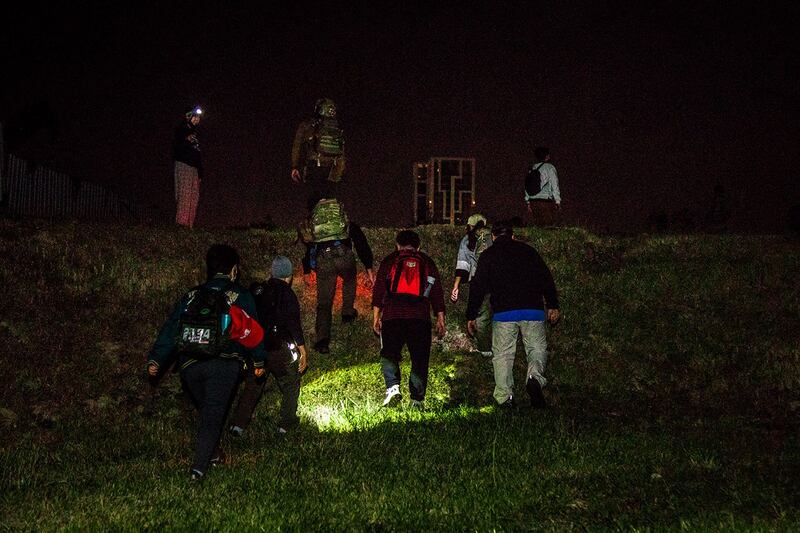
Two years later, more than 20 groups are running in Taiwanese cities and counties, as part of a spontaneously organized and decentralized civilian defense movement.
You set up the Taichung group a year ago to prepare local people for what she terms the "compound disaster" of war, getting a handful of replies at first to a social media post. Now, the group has about 60 members, most of them working professionals, with 15-20 people typically attending an evening training session.
"For every person who trains to save themselves, more resources are freed up for people in greater need," You says.
Weight training, first aid
The group started out with weight training, so they would be able to carry heavy loads in the event of an emergency, then moved onto first-aid skills like bandaging and tourniquets.
Instructor Wei Ting was inspired to join by her personal memories of disaster -- when a massive earthquake hit her hometown on Sept. 21, 1999, cutting off her community from the rest of the world for two weeks.
"This experience motivated me to take action, and made me willing to take responsibility," says Wei, who now teaches high school and holds multiple first-aid qualifications and is a government-trained disaster relief volunteer.
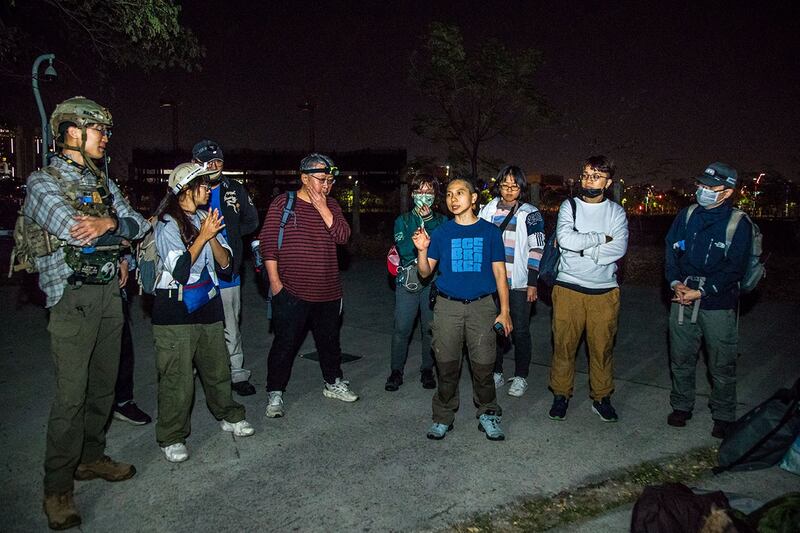
The group's head instructor Luo Hsuan-hsuan is a physical therapist who has also worked as a paramedic. She supervises their physical training and devises training scenarios like the one in Taichung park.
The group is also working with local companies, schools and security organizations to deliver disaster response and rescue training to local people.
"The ideal self-training group is a mutual-help community where everyone can contribute their own expertise," You says, adding that she wants members to take what they have learned back to their schools, workplaces and families, and train more people.
It's a more rescue-based vision than the retired chip billionaire Robert Tsao's US$33 million Kuma Academy program, set up to train 3 million civilians in civil defense, including 300,000 snipers, so they could fight alongside regular and reserve forces in the event of a Chinese invasion.
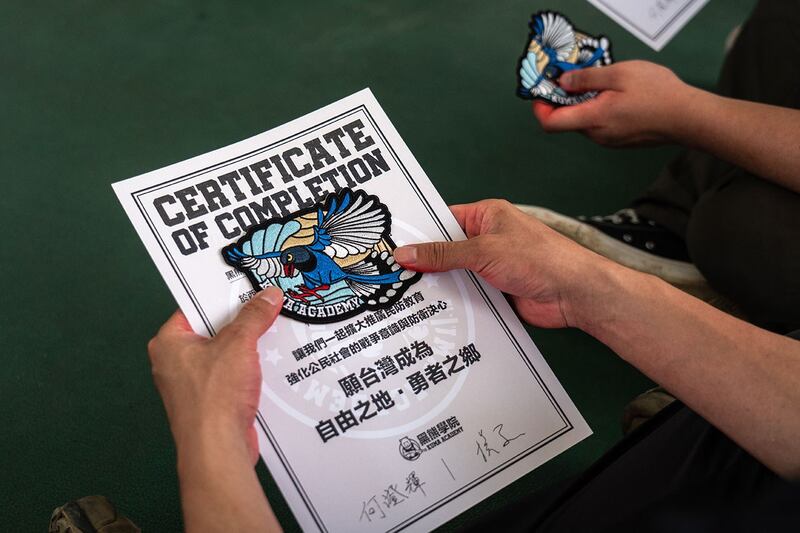
Tsao, the 75-year-old founder of United Microelectronics Corps, reapplied for Taiwanese nationality in 2022 after naturalizing as a citizen of Singapore, saying he wanted to help in the fight against the military threat from Beijing.
Simulated battles
The program held two large-scale training drills under the code-name "Operation Magpie" last year, one challenging the forest survival skills of more than 100 trainees over an 8-hour period, and another simulating a wartime attack in downtown Taipei.
Groups were thrown into unfamiliar situations with just a few aerial photos of the area, with instructions to plan their way through the scenario, navigating simulated scenes of battle and civilian injuries, complete with sound-effects.
Kuma Academy CEO Ho Cheng-hui said the primary goal during a disaster is self-protection.
"[We want] at least one person in every household who is prepared for the threat of war, and knows what to do," Ho told RFA/The Reporter in a recent interview.
Another civil defense organization, the Forward Alliance, held a backup operations training day at Taipei's Huashan Park in September 2023, bringing in old vehicles and rescue equipment, and teaching people how to rescue others from car crashes, fires, earthquakes, shootings and other complex events.
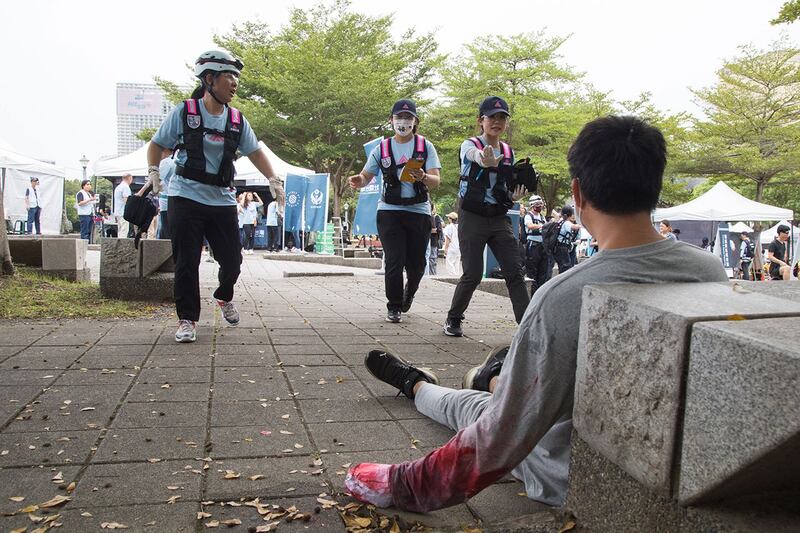
The event ended with a surprise simulated "terrorist attack" on participants, who were forced to organize a mass evacuation on the spur of the moment, despite being exhausted.
Meanwhile, more than 50 people have joined the Tainan branch of the Citizens' League civil defense and rescue organization, which is currently applying to register as an official rescue organization under the Ministry of the Interior.
The 28-year-old founder of the Tainan Citizens' League, who gave only the nickname Jeff, said his group is working on a local map of potential high-risk military targets, including electrical substations, refineries and airports.
It has also developed a mobilization plan for Tainan that would see members gathering at designated locations in the wake of an attack or disaster, before moving ahead with further evacuation or disaster relief operations.
Women taking the lead
Liu Wen, an assistant researcher at the Institute of Ethnology at Taiwan's Academia Sinica said the civil defense movement is likely a coping mechanism in the face of anxiety over a possible invasion.
"That anxiety isn't going to go away for most people, but it can be organized and transformed," Liu said. "It can be turned into proactive energy, allowing people to start preparing, rather than just crying out in fear."
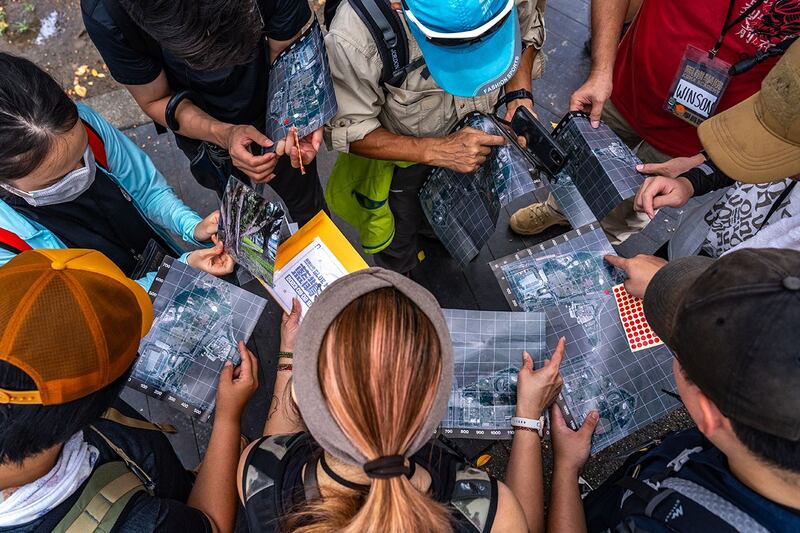
She said she has found that civil defense groups are often dominated by women, who have largely been left out of official defense and national security plans.
Figures from Kuma Academy and the Forward Alliance back up Liu's research, with women making up some 60% of Kuma Academy trainees in 2023, and around 70% of Forward Alliance volunteers.
"Taiwan's national defense and civil defense systems have long excluded women," Liu said. "Women haven't had the opportunity to learn about military issues. The only way they could do that would be to join the military."
She said women actually make ideal community leaders in disaster rescue and civil defense operations.
"They understand their own needs and those of their families very well, so they pay attention to detail, and are more efficient when preparing supplies," Liu said. "They're also more accustomed to cooperating with others."
A member of a Self-Training Group in the northern city of Taoyuan who gave only the nickname Emily is a full-time mother of two who doesn't always make it to every session, but she already has an evacuation plan for her family.
Her home has floor-to-ceiling windows in the vicinity of the Taoyuan Railway Station that is an obvious hazard in the event of war, earthquake or typhoon, so she has designated a safe area away from the window, where she stashes emergency supplies.
She also knows how she will get her kids out of the 10th floor apartment with the family's supplies, and the route they will take to their local evacuation point.
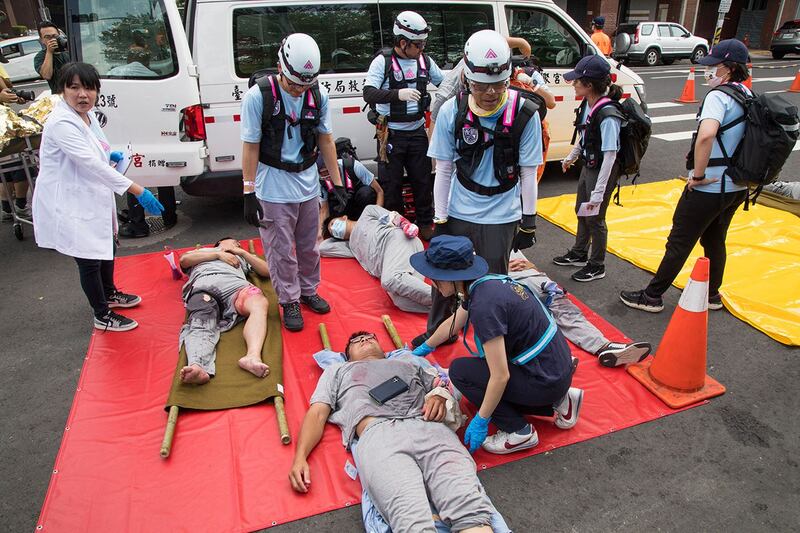
None of her family is very interested when she tries to talk to them about it, however.
"They thought I was kicking up a fuss about nothing," she says, adding that she tells them that the Self-Training Group is just a fitness club.
"I stay quiet and keep my anxieties to myself," Emily says, adding that she did try to broach the topic again during the recent earthquake in Japan.
Training oneself
A fellow Taoyuan group member, a 27-year-old banker who gave only the nickname Davis, said many group members develop their skills independently, then share them with the rest of the group.
He is already a certified life-saver, a junior EMS and a Combat Casualty Care assistant, training he undertook in his own time and at his own expense.
"My life over the past year has been all about being in class," he says. "Almost no rest days."
Meanwhile, in Hsinchu county, the Shufeng Disaster Prevention Self-Training Group, who have a high proportion of parents with school age children, have been practicing carrying their kids on their back to train for a possible evacuation scenario.

Shufeng group member Yeh Hsin-mei – a pseudonym as she didn’t want to be identified – is a 52-year-old dentist, whose kids are both grown.
She holds Advanced Cardiac Life-saving Surgery Pre-hospital Trauma Life-saving Surgery certificates that are only available to medical practitioners, and frequently shares her skills and knowledge with the group.
She has already been called to public service -- during the early days of the pandemic in Taiwan.
"I was mobilized to help with rapid testing during the COVID-19 [restrictions]," Yeh says, adding calmly: "If there is a war, I will very likely be drafted."
Translated by Luisetta Mudie. Edited by Malcolm Foster.
This report was jointly produced by RFA Mandarin and The Reporter , a Taiwan-based investigative magazine. The names of Emily, Jeff, Davis and Yeh Hsin-mei have been changed at their request.
